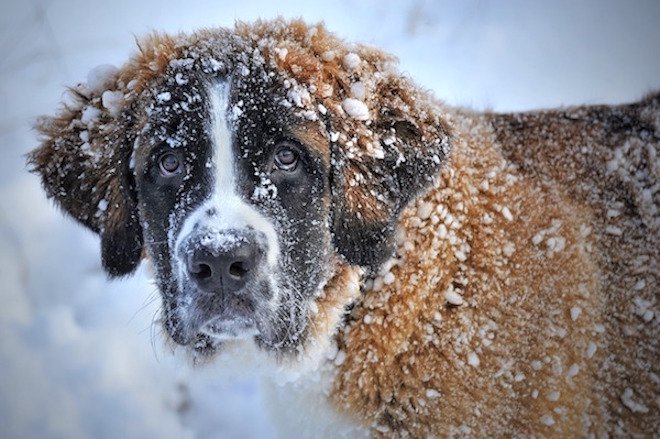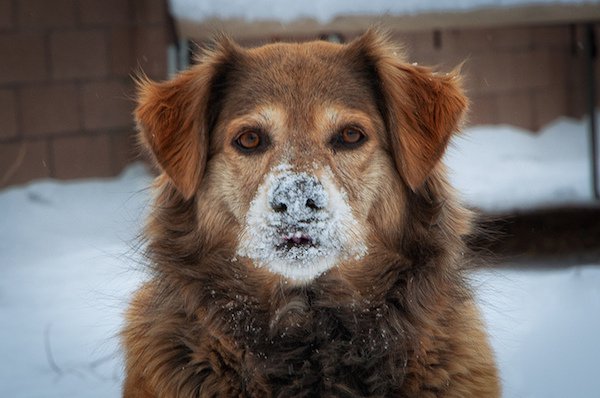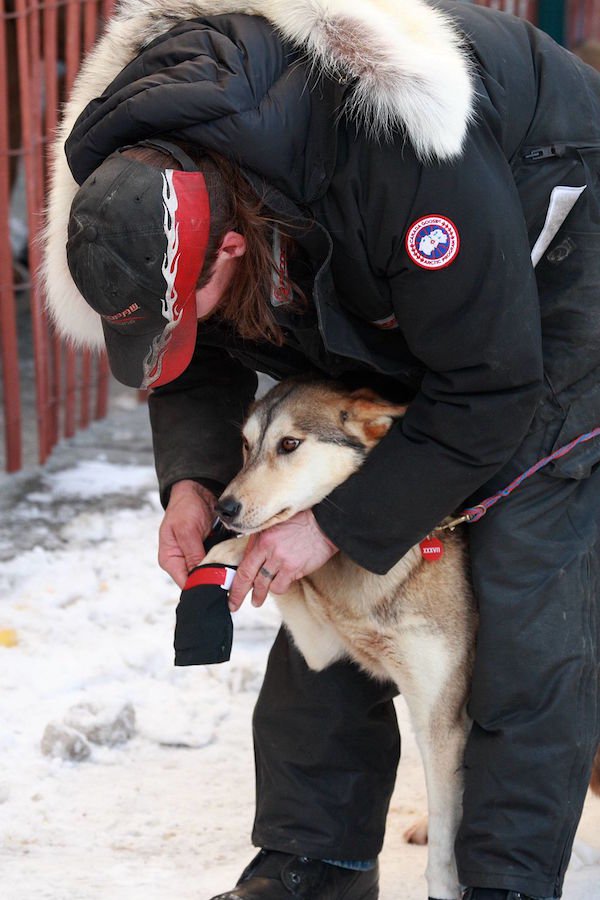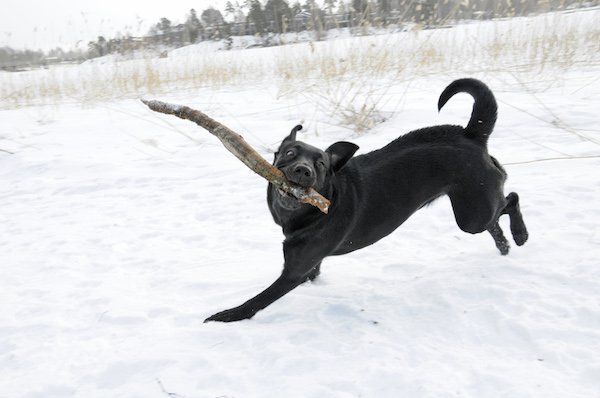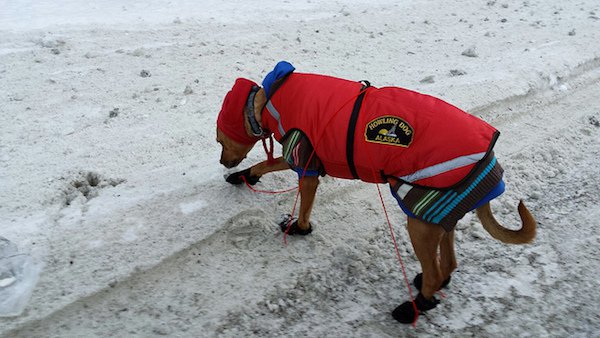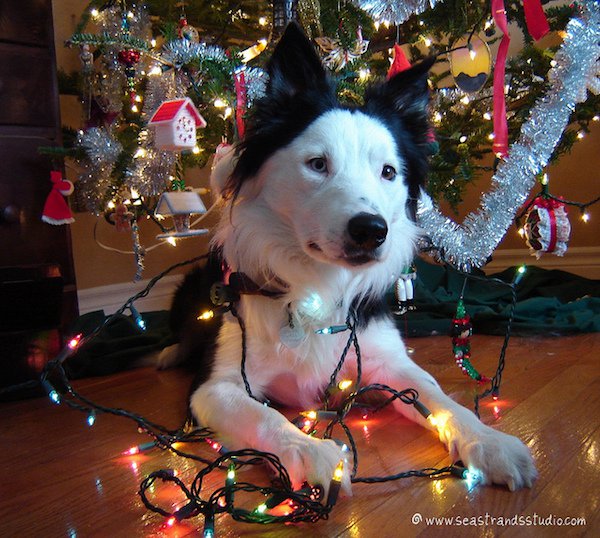[ad_1]
When winter arrives, preparations are made to homes, vehicles, and personal clothing to adapt to the colder temperatures and winter weather. This is also the time to take additional precautions to keep our dogs safe and healthy during the winter and holiday season.
Even the most well-looked after dogs can fall victim to injuries from harsh weather, but also from the common items used to counteract snow and ice and decorate our homes. Taking a few precautions around the home will keep your dog healthy and safe.
General Winter Care Tips
Maintaining your dog’s health and grooming regularly are important during the winter. Many dogs are simply no longer able to withstand cold temperatures as their wolf ancestors can. Centuries of selective breeding means that some breeds of dogs will not withstand colder temperatures at all. Their paws and fur coats are simply unable to protect them from the winter elements.
Here are a few care tips:
- Towel or blow-dry your dog if he/she gets wet from rain or snow. Keeping them dry will help dogs from becoming chilled, catching a cold or aggravating arthritis (if your dog suffers from sore joints).
- Ice, snow and the cold may crack and cut the pads of your dog’s feet, so it is important to dry and clean paws. A little petroleum jelly or paw wax may soften and protect the pads and prevent further cracking. If you go outdoors a lot in winter, and your dog’s paws are prone to damage, you may want to consider booties, such as Muttluks or other winter wear booties.
- Ice and cold can also cut and damage your dog’s nose. If your dog’s nose is crusty, chapped or dry applying a shea butter product made for dogs such as Snout Soother, can help re-moisturize the skin.
- Provide plenty of fresh water. Just like in summer, your dog can get dehydrated in the winter, and snow is not a good water substitute.
- Groom your dog regularly to keep your dog properly insulated. Short- or coarse-haired dogs may get extra cold, so consider a sweater or winter coat. Long-haired dogs should have excess hair around the toes and foot pads trimmed to ease snow removal and cleaning.
- If your dog is a working dog and spends a lot of time outdoors, increase your dog’s daily calories, as it takes more energy in the winter to keep body temperature regulated.
- Just like people dogs can get the flu (canine influenza) or colds, so if your dog exhibits any severe symptoms consult a veterinarian.
- Be extra careful when walking or playing with your dog near frozen lakes, rivers or ponds. Keeping your dog on leash around frozen waters will prevent your dog from falling through ice and get seriously injured or drowning.
Protection From The Cold
Your dog may have fur, but that doesn’t mean your dog won’t be affected by the cold. So don’t leave your dog outside in the cold for long periods of time and monitor outdoor activity. Frostbite is always a hazard. To prevent frostbite on your dog’s ears, tail and feet, don’t leave your dog outdoors for too long.
Adequate shelter is a must. Like people, dogs seem to be more susceptible to illness in the winter so keep your dog warm, dry and away from drafts. Tiles and uncarpeted areas of your home may become extremely cold, so make sure to place blankets and pads on floors in these areas (especially in garages and basements). We also very strongly recommend you never leave your dog in an unheated outdoor shelter in cold weather.
Finally, don’t leave your dog alone in a car during winter. When the car is off, the temperature in the car will get dangerously cold. If the car is idling, carbon monoxide can build up and endanger your dog’s life.
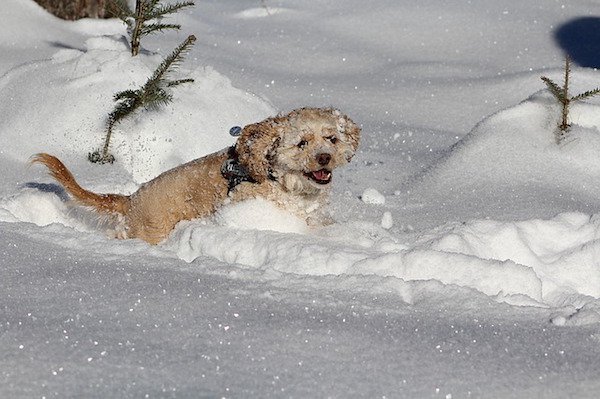
Around The Home
Fireplaces and Portable Heaters
Be very careful of fireplaces and portable heaters, which can severely burn your dog. Make sure all fireplaces have screens, and keep portable heaters are out of reach from your fur friends.
Human Food
Chocolate, alcohol, cooking dough, grapes and other treats are enjoyed during festivities are unfortunately toxic for your dog, even in small amounts. Keep your holiday goodies out of your pets’ reach. Refresh your memory as to foods that are toxic for dogs in DogHeirs article series “Toxic Food For Dogs”
Human Medications
Colds, flus, hangovers – you may be needing to use medications in the wintertime. But dogs accidentally eating human medications is one of the top 10 causes of dog poisonings each year. The most common culprits are nonsteroidal anti-inflammatory medications like ibuprofen (for example, Advil), acetaminophens (for example, Asprin). Accidental ingestion of antidepressants is also common. If you happen to drop a pill on the floor, look for it immediately, and be sure to put your pill containers out of reach of your dog. If your dog does happen to ingest one, consult with your veterinarian immediately.
Antifreeze Precautions
Most cases of antifreeze poisoning in dogs and cats occur around the pet’s own home. Antifreeze, which often collects on driveways and roadways, and in garages, can be a deadly winter hazard for pets, who find the taste appealing. Although it smells and tastes good to your dog, it can be lethal.
Common antifreeze is made of ethylene glycol, a known toxin. Small puddles on the ground pose an immediate threat to dogs and cats, as well as nearby wildlife, which are attracted to the smell.
In most cases, even small doses (even a small teaspoon) of ingested antifreeze can be fatal unless spotted and treated quickly. Recently, major manufacturers announced they are voluntarily adding a bitter agent – denatonium benzoate – to deter animals from accidentally poisoning themselves.
Consider using a less toxic alternative antifreeze, available at most auto supply stores. Non-toxic antifreeze is made of methyl alcohol or propylene glycol (brands include Sierra, Prestone Low Tox, Camco and Texaco PG). These types are less hazardous and kinder to the environment, although it should be noted any type of antifreeze is still toxic to pets. The “pet-safe” propylene-based antifreeze is toxic to animals, just not as as dangerous as the traditional ethylene glycol.
Take the following precautions when handling antifreeze:
- Clean up antifreeze spills immediately.
- Check the ground beneath your car’s engine regularly for leaks. A green or blue liquid indicates antifreeze.
- Store antifreeze in clearly marked containers out of your dog’s reach (and children’s reach too).
- Never allow your dog to have access to the area when you are draining antifreeze from your car.
- If you suspect that your pet has ingested antifreeze, contact your veterinarian immediately.
- When you replace antifreeze, or if you flush your radiator, remember to take the used antifreeze to your local auto repair or radiator shop where it can be recycled. Never flush it down the drain or spill it into your driveway or roadside as it could harm other neighborhood animals as easily as your own.
Rock Salt and De-icing Compounds
Rock salt, used to melt ice on sidewalks, may irritate your dog’s footpads and is toxic if ingested. Be sure to rinse and dry your dog’s feet after a walk. De-icing rock salts are mixed with chemical solvents that are toxic to animals. Try buying pet-friendly, non-corrosive de-icing compounds such as sand or Safe Paw Ice Melter or Morton Safe-T-Pet Snow & Ice Melt, and encourage your neighbors to use them as well.
Windshield Washer Fluid
Windshield washer fluid is a brightly-colored liquid made of methanol, also known as methyl alcohol and wood alcohol. Methanol is extremely toxic, a few tablespoons can be fatal to a dog. Although it’s unlikely your dog will ingest windshield wiper fluid, keep it away from your dog’s reach. Also consider getting a non-toxic version to lessen the impact on the environment and wild animals, as the run-off from all our cars spills into roadways and leaches the toxins into the environment.
During the Holidays
Christmas Trees
It’s probably best to not leave your dog unattended in the room with your Christmas tree, especially if your dog is a chewer. Objects on the tree can cause harm to your dog if they are accidentally swallowed or chewed. Here’s some precautions to follow:
- Remove holiday lights from lower branches of your tree, as they may get very hot and burn a dog.
- Watch out for electrical cords. Pets often try to chew them and may get badly shocked or electrocuted. Place wires out of reach.
- Avoid hanging glass ornaments, as they can break and may cut a dog’s feet and mouth.
- Avoid hanging edible ornaments. They may tempt your dog to eat them and they can die from ingesting them. And many commercial ornaments may contain paint or toxins in the preservatives.
- Whether your tree is live or artificial, both kinds of needles are sharp and indigestible, so keep an eye on your dog.
- Tinsel is dangerous for dogs if ingested as it may cause intestinal blockages.
Christmas Poinsettias
The sap of Poinsettias is considered to be mildly toxic/irritating, and will probably cause nausea or vomiting, but not death. But it’s best to be cautious and keep the plant away from your dog and avoid getting a sick pet.
Mistletoe & Holly
Mistletoe and holly are moderately to severely toxic for dogs, so keep them out of reach of your dog and call your veterinarian or poison control center immediately for specific advice, should one of these plants be ingested.
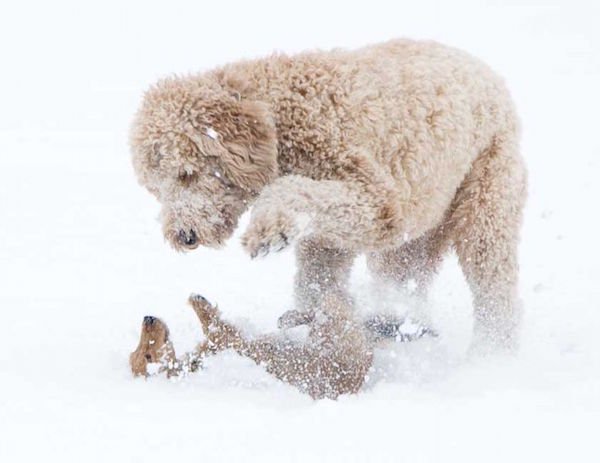
Have a safe and fun winter season with your dogs.
Disclosure: This article contains affiliate links. As an Amazon Associate, we may earn a small commission from qualifying purchases made via these links.

